At Wemaxa, we specialize in integrating third-party services to expand your website or application’s capabilities and streamline how your business operates. Whether you’re using marketing tools, payment processors, CRMs, or cloud-based platforms, our team ensures these services work seamlessly with your digital infrastructure. The goal is to reduce manual work, eliminate redundancies, and create a more connected experience for both your team and your users.
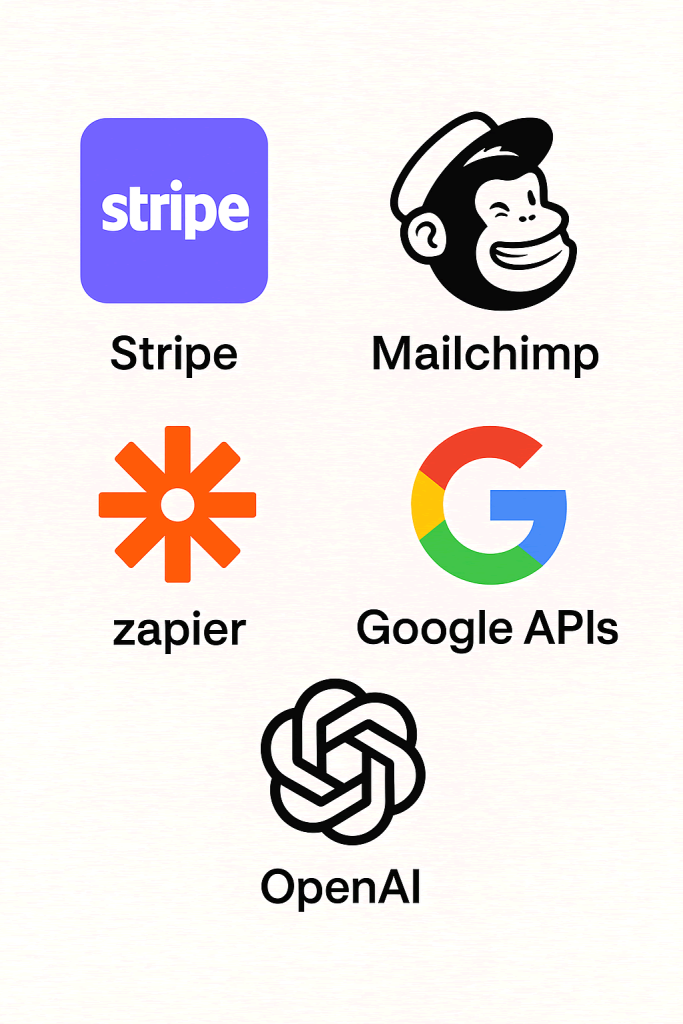
We support a wide range of integrations, including tools like Stripe, PayPal, Mailchimp, Google Analytics, HubSpot, Zapier, and many others. These connections allow you to automate tasks such as sending email confirmations, tracking user behavior, syncing customer data, or handling online transactions. For e-commerce projects, we also integrate shipping, tax calculation, inventory systems, and affiliate platforms to create a full-service, automated shopping experience.
🔧 How We Handle Integrations
- Secure API keys & token handling via .env configs or cloud secrets
- Webhooks & event-driven workflows
- Failover & retry logic for critical integrations
- Custom middleware for adapting third-party formats to your database or frontend
🔌 Third-Party Integration Capabilities at Wemaxa
✅ Popular Integration Categories
- 💳 Payment Gateways
- Stripe, PayPal, Razorpay
- Subscription billing, one-time payments, webhook handling
- Secure PCI-compliant implementation
- 📨 Email & Communication
- SendGrid, Mailgun, SMTP2GO
- Automated email notifications, transactional emails, newsletters
- Contact forms with reCAPTCHA & spam protection
- 🧠 AI & Machine Learning
- OpenAI (ChatGPT API), Hugging Face, TensorFlow Serving
- Custom inference endpoints for chatbots, recommendations, and automation
- 🔐 Authentication & Identity
- Google, Facebook, Apple, GitHub OAuth
- Role-based access control, token refresh handling, secure login flows
- 📊 Analytics & Performance
- Google Analytics, Mixpanel, Hotjar, New Relic
- Integrated dashboards for user behavior, conversion tracking, and server performance
- ☁️ Cloud & DevOps Tools
- AWS, Google Cloud, DigitalOcean Spaces
- Object storage, CI/CD via GitHub Actions, GitLab CI, or Jenkins
- 📂 CMS & Headless Content Platforms
- WordPress REST API, Contentful, Strapi
- Decoupled architecture with JAMstack or React/Vue frontends
- 🧾 CRM / ERP / Marketing
- HubSpot, Salesforce, Mailchimp, Zoho CRM
- Lead capture, segmentation, customer pipeline automation
Every integration is tailored to your specific workflows and business needs. We don’t just plug in tools we configure them with your goals in mind. This includes setting up data mapping, trigger-based automations, and customized logic where needed. Whether your systems are cloud-based, desktop, or hybrid, we ensure smooth data flow and reliable performance across all touchpoints.
At Wemaxa, integrations are more than just add-ons. They are part of a broader strategy to enhance your platform’s power and adaptability. By connecting your site or app to the right third-party tools, we help you unlock new capabilities without rebuilding your entire system. This approach saves time, reduces complexity, and positions your business for smarter growth.
MORE LINKS:
What is Fullstack?
What is Backend?
Supported Databases
Data storage methods
API creation
Hosting Setup
Backend developer
Project scaling
Average turnaround
INTEGRATING THIRD PARTY SERVICES
When clients approach us with the question “Can you integrate third-party services?”, the short answer is yes, but the long answer requires a deeper exploration of how Wemaxa approaches the challenge of connecting your digital platform with external providers in a way that is not just functional but scalable, maintainable, and secure over the long term. Integrations today are no longer about just embedding a payment form or syncing an email list they are about creating resilient bridges that connect multiple systems, enabling real-time data exchange, and ensuring that different platforms operate as part of a cohesive ecosystem rather than as isolated silos. Wemaxa begins with an architectural review of your current stack, mapping out which external services play a role in your business operations, whether it’s a financial gateway, a CRM, a logistics platform, a customer support tool, or a specialized AI service. We analyze their APIs, authentication flows, data models, quotas, and long-term update cycles before writing even a single line of integration code. This upfront diligence ensures that every integration is not only technically possible but strategically aligned with your workflows. Our philosophy is that a third-party integration should feel invisible to the end-user fast, reliable, and seamless, without the cracks or bottlenecks that poorly implemented connections tend to reveal.
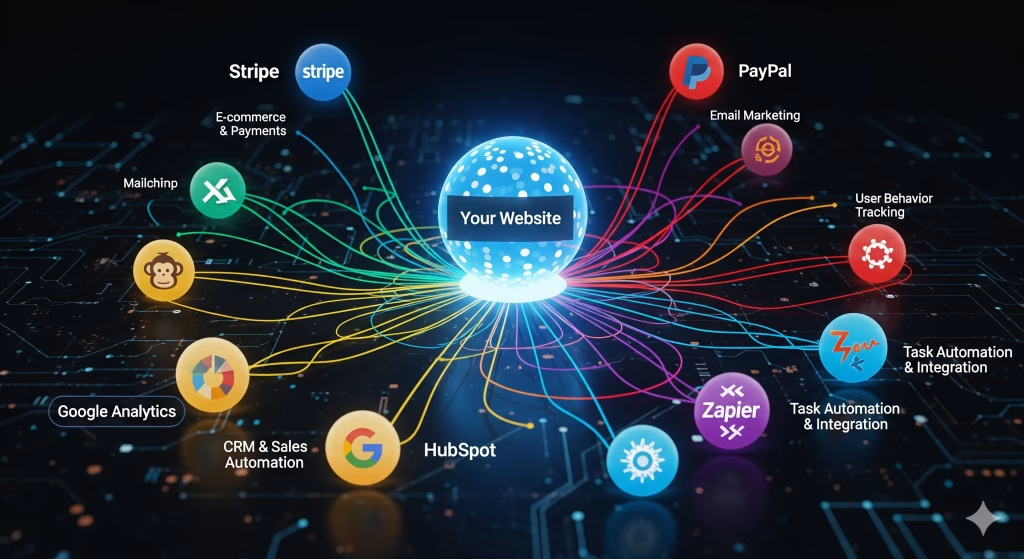
Building these integrations involves far more than connecting two endpoints. Wemaxa engineers take a systems-level view, constructing modular connectors that can evolve with your business needs. For instance, instead of hardwiring calls directly into an application, we often design middleware layers that manage communication with third-party APIs. This middleware handles crucial responsibilities such as request validation, rate limiting, retries, caching, logging, and fallback strategies. By encapsulating this logic, the core application remains clean and easier to maintain, while the integration layer can adapt independently as providers update their APIs or modify terms of service. In practice, this means that if a payment gateway changes its authentication requirements, or a marketing platform introduces a new API version, we can update the connector without rewriting your entire application. This modular architecture not only saves costs in the long run but also gives clients confidence that their business-critical integrations will not collapse every time an external provider makes changes. Moreover, we enforce strict data sanitation and validation rules to ensure that incoming data is clean, expected, and safe to process, preventing data corruption or injection attacks that could compromise your system.
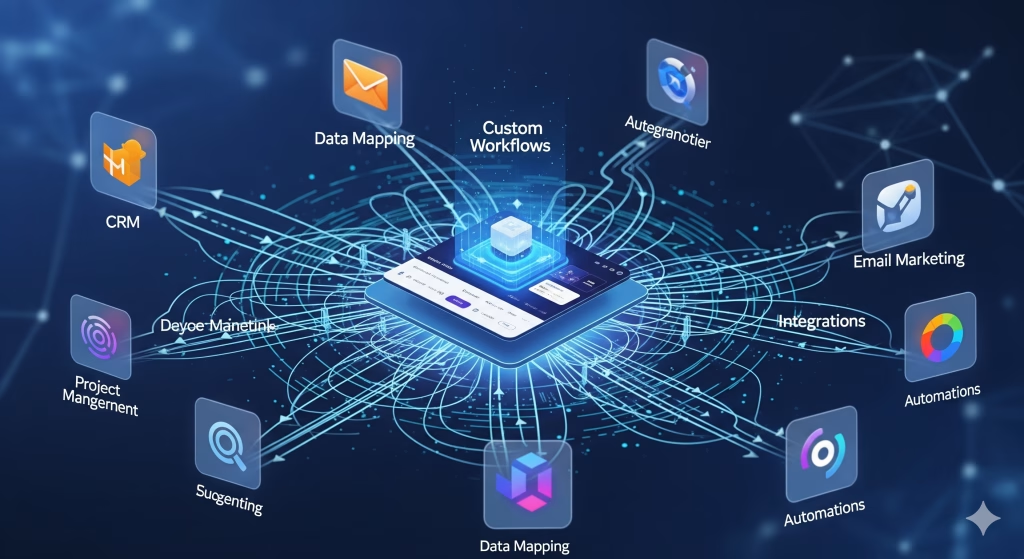
The scope of integrations Wemaxa supports is vast, covering every major category of external service businesses depend on today. Payment processing is one of the most common use cases, and we frequently integrate with platforms such as Stripe, PayPal, or Adyen to enable secure transactions, recurring billing, subscription management, and invoicing. CRM synchronization is another critical requirement, with tools like Salesforce, HubSpot, or Zoho CRM helping organizations centralize customer interactions and sales pipelines. For marketing automation, integrations with Mailchimp, SendGrid, or ActiveCampaign allow businesses to automate campaigns, trigger transactional emails, and segment audiences dynamically. Analytics and event tracking integrations with Google Analytics, Mixpanel, or Segment give businesses actionable insights about user behavior. For more advanced use cases, Wemaxa integrates AI services like OpenAI, allowing platforms to leverage natural language processing, content generation, or moderation tools. Workflow automation services such as Zapier and n8n extend capabilities even further, connecting multiple services into powerful automated processes that eliminate manual intervention.
Every integration we implement follows enterprise-grade standards for **security, observability, and resilience**. API credentials such as keys, tokens, or secrets are never stored in source code they are kept in secure storage solutions like environment variables, cloud-based secret managers, or vault systems. Communication with third-party APIs always runs over encrypted HTTPS/TLS channels, ensuring no sensitive data travels in plain text. Authentication is handled with modern standards such as OAuth 2.0, JWT-based sessions, or HMAC signing, depending on the provider’s requirements. Wemaxa also applies **rate limiting and retry strategies** to respect provider quotas while ensuring reliability under network failures or downtime. Webhooks, one of the most common patterns in integrations, are carefully validated, with signatures verified before processing payloads to protect against spoofing attacks. Logging and monitoring systems capture every request and response, enabling real-time visibility into integration performance, success rates, and anomalies. We configure alerts so that if an external provider fails or behaves unexpectedly, your team receives immediate notification. This proactive monitoring minimizes downtime, preserves user experience, and protects business continuity even when third-party systems are unstable.
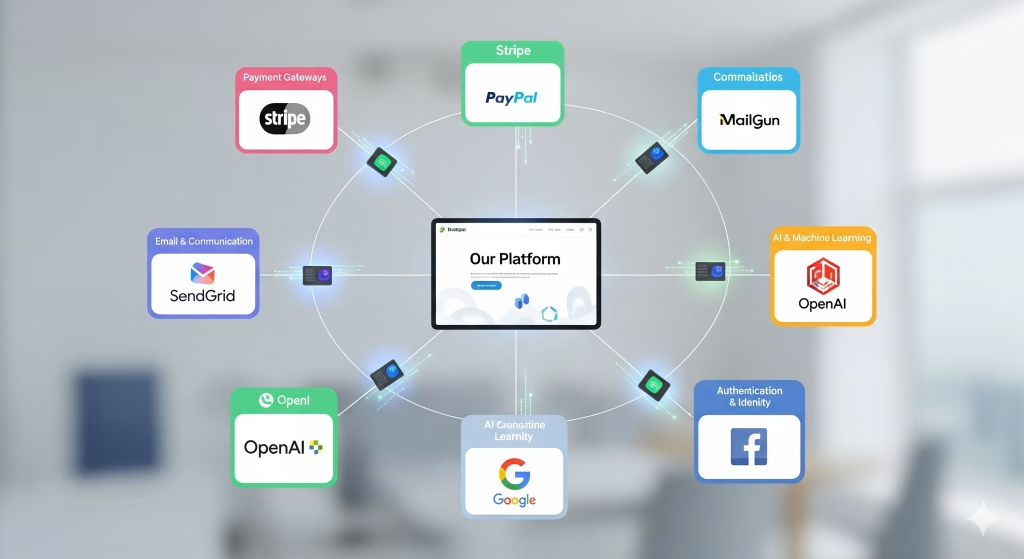
Another aspect that distinguishes Wemaxa’s approach is how we treat integrations as a **lifecycle** rather than a one-time feature. Third-party services evolve continuously they introduce new endpoints, deprecate old ones, change quotas, or alter authentication flows. A static integration can quickly become brittle under these conditions. That’s why we design integrations as versioned modules with documentation that explains not only how they work but also how they can be updated or replaced. When an external service announces changes, Wemaxa ensures your platform transitions smoothly, maintaining backward compatibility where possible and scheduling gradual rollouts of updates. Sandbox testing environments are often set up so that new integrations can be validated without affecting production systems. Automated testing suites simulate API calls, webhooks, and error scenarios, ensuring that integrations behave as expected across staging and live environments. By embedding testing, monitoring, and documentation directly into the integration pipeline, Wemaxa guarantees that your platform does not just connect with external tools but stays connected reliably, no matter how the external landscape evolves.
The benefits of deep and well-executed integrations for businesses are enormous. For an e-commerce company, this might mean automatic synchronization of orders, payments, shipping statuses, and customer data across platforms like Shopify, Stripe, FedEx, QuickBooks, and Mailchimp without any manual intervention. For SaaS platforms, integrations can connect authentication providers like Auth0, analytics platforms like Mixpanel, collaboration tools like Slack, and workflow automation engines like Zapier, creating a unified ecosystem that serves both the company and its clients more effectively. For enterprises operating across multiple regions, integrations may involve regulatory compliance systems, tax calculation services, or multi-currency payment processors that ensure legal and operational consistency worldwide. By designing integrations that reduce manual work, improve data accuracy, and enable automation, Wemaxa helps businesses save time, reduce costs, and deliver better customer experiences. These integrations become competitive advantages enabling companies to offer services faster, scale operations more efficiently, and adapt to changing market demands without needing to rebuild their systems from scratch.
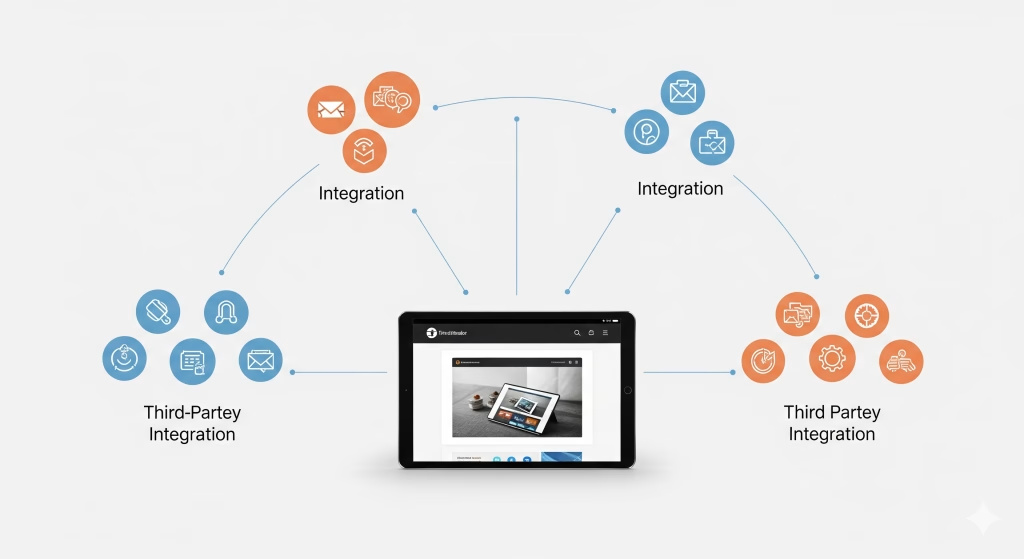
In conclusion, Wemaxa treats third-party service integrations as a **strategic cornerstone** of digital development rather than a superficial add-on. We combine architectural foresight, rigorous security practices, modular design, real-time observability, and lifecycle management to ensure that your integrations remain reliable, secure, and adaptable for years to come. Clients receive not only the functional connectors but also full documentation, testing coverage, monitoring dashboards, and update strategies, empowering them to extend or evolve integrations without unnecessary risk. By embedding these principles into every project, Wemaxa enables businesses to harness the power of best-of-breed third-party services payments, CRMs, analytics, AI, automation, logistics without sacrificing stability or performance. Integration is not just about connecting systems; it is about building ecosystems where every part works together to create stronger, smarter, and more efficient digital experiences.


